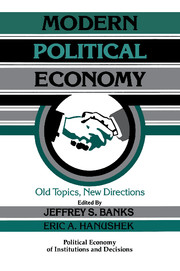Book contents
- Frontmatter
- Contents
- List of contributors
- Series editors' preface
- Preface
- Introduction
- 1 The economics and politics of regulation: perspectives, agenda, and approaches
- 2 Regulatory commitment and utilities' privatization: implications for future comparative research
- 3 The political economy of transformation: liberalization and property rights
- 4 Politics and trade policy
- 5 Elections, party structure, and the economy
- 6 The politics and economics of budget deficit control: policy questions and research questions
- 7 Law, legislation, and positive political theory
- 8 The rational choice theory of social institutions: cooperation, coordination, and communication
- Index
8 - The rational choice theory of social institutions: cooperation, coordination, and communication
Published online by Cambridge University Press: 07 May 2010
- Frontmatter
- Contents
- List of contributors
- Series editors' preface
- Preface
- Introduction
- 1 The economics and politics of regulation: perspectives, agenda, and approaches
- 2 Regulatory commitment and utilities' privatization: implications for future comparative research
- 3 The political economy of transformation: liberalization and property rights
- 4 Politics and trade policy
- 5 Elections, party structure, and the economy
- 6 The politics and economics of budget deficit control: policy questions and research questions
- 7 Law, legislation, and positive political theory
- 8 The rational choice theory of social institutions: cooperation, coordination, and communication
- Index
Summary
INTRODUCTION
In both economics and political science, the study of institutions has achieved a new and increasing prominence over the past twenty years. This emphasis contrasts with economists' previous devotion to the neoclassical paradigm and, to some extent, with behavioralist and pluralist approaches to studying politics. In part this change is due to an interest in problems concerning particular institutional settings: the efficient structuring of the business firm, the nature and practice of economic regulation, the criticism or reform of democratic political institutions, and, more recently, the transition from command economies and totalitarian polities to more capitalistic and democratic forms. But, partly as a result, there has also been an increased appreciation of the need for positive economic and political theory that not only incorporates institutions and their effects, but also gives us tools to analyze institutional formation, maintenance, and change.
It is a measure of the importance of the idea of institutions in social science that the term often goes without an explicit definition in many studies to which it is central, even though writers who do define the term give it a great variety of meanings.
- Type
- Chapter
- Information
- Modern Political EconomyOld Topics, New Directions, pp. 216 - 268Publisher: Cambridge University PressPrint publication year: 1995
- 68
- Cited by



